Profile and Research
Profile /Research
Profile
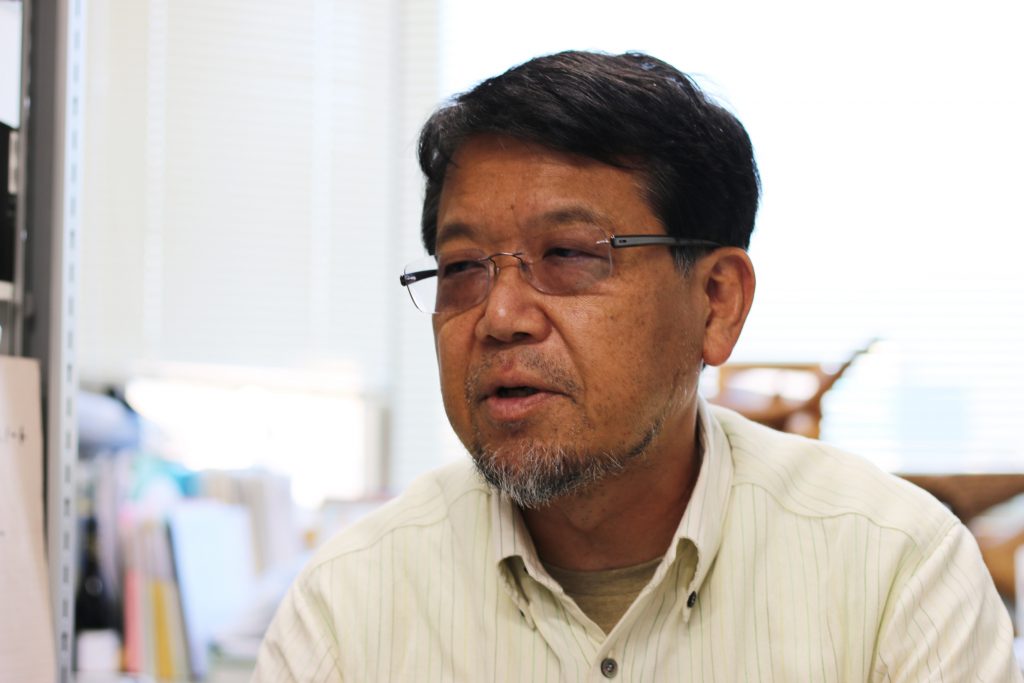
| Name | Hajime Kayanne |
| 生年月日 Birthday | November 9 1954 |
| 研究分野 Field of study | Earth system science, coral reef science |
| Research topic | I study responses of coral reefs to global warming, sea level rise and ocean acidification by field survey and laboratory experiment, and construct a model, based on which, I will propose a mitigation and adaptation measures in the course of the global change to establish a new relation between human and coral reefs. |
| Organization | Department of Earth and Planetary Science, The University of Tokyo |
| Adress | Rm. 633, Science Bldg.1 7-3-1 Hongo, Bunkyo-ku, Tokyo 113-0033 JAPAN |
| TEL | 03-5841-4573 |
| FAX | 03-5841-4690 |
| kayanne_at_eps.s.u-tokyo.ac.jp (please replace “_at_” with “@”) | |
| Education | |
| Musashi High School, Tokyo, March 1978 | |
| B. Sc. Department of Geography, The University of Tokyo, March, 1982 | |
| M. Sc. Department of Geography, The University of Tokyo, March, 1984 | |
| Ph. D. Department of Geography, The University of Tokyo, March, 1989 | |
| Professional Experience | |
| Apr. 1987-Mar. 1988 | JSPS Research fellowship for young scientists (DC) |
| Apr. 1988-Oct. 1992 | Scientist, Marine Geology, the Geological Survey of Japa |
| Oct. 1992-Mar. 1995 | Chief Scientist, Marine Geology, the Geological Survey of Japan |
| Apr. 1995-Mar. 2000 | Associate Professor, Department of Geography, The University of Tokyo |
| Apr. 2000-Nov. 2007 | Associate Professor, Department of Earth and Planetary Science, The University of Tokyo |
| Nov. 2007- | Professor, Department of Earth and Planetary Science, the University of Tokyo |
| Concurrent appointment | |
| Apr. 2013-Mar. 2019 | Chairperson, Ocean Literacy Program, UTokyo Ocean Alliance, The University of Tokyo |
| Apr. 2019- | Deputy Head, Center for Ocean Literacy and Education, Graduate School of Education, The University of Tokyo |
| External Activities | |
| Contribution to Academic Community | |
| FY2012-2017 | Council member and Executive Secretariat, Japanese Coral Reef Society |
| FY2018 | Director, Japanese Coral Reef Society |
| FY2017-2018 | Director, Japan Society for Pacific Island Studies |
| Outreach Activity | |
| FY2015-2018 | member, Ministry of Land, Infrastructure, Transport and Tourism, Committee for Protection of Coral Reef Coast |
| FY2012-2018 | member, Ministry of Defense, Committee for Environmental Impact Monitoring of Alternative Facility Construction for Futenma Air Station |
| FY2012-2014 | reviewer, FY2017-2018 KAKENHI |
| FY2012-2016 | member, Japan Institute of Country-ology and Engineering, Research Committee for Protection of Okinotorishima (consigned by Ministry of Land, Infrastructure, Transport and Tourism |
| FY2012-2018 | member, Waterfront Vitalization and Environmental Research Foundation, Analysis and Evaluation Commission for Coral Transplantation regarding Port Facilities Construction at a Specified Remote Island (consigned by Ministry of Land, Infrastructure, Transport and Tourism |
| FY2012-2017 | member, Fisheries Infrastructure Development Center, Review Committee for Preservation and Restoration Technologies of Coral Reefs under Severe Conditions (consigned by Fisheries Agency) |
| FY2018 | chair, Fisheries Infrastructure Development Center, Review Committee for Preservation and Restoration Technologies of Coral Reefs under Severe Conditions (consigned by Fisheries Agency) |
| FY2012-2017 | member, Ocean Policy and Research Institute, Investigation Committee for Sustainable Development of Island and Ocean |
| Internal Committee Membership | |
| FY2012 | Chair, Department of Earth and Planetary Science (graduate), Education Committee |
| FY2013 | Head, Department of Earth and Planetary Environmental Science (undergraduate) |
| FY2018 | Chair, Departments of Earth and Planetary Science, and Earth and Planetary Environmental Science (undergraduate), Education Committee |
| FY2017-2018 | Rigakubu-News Editorial board, Graduate School of Science, Public-relations committee |
| FY2012-2018 | Council member and head of Geography Unit, The University Museum, The University of Tokyo |
| FY2012-2018 | Council member, Center of Spatial Information Science, The University of Tokyo |
Research
Major Achievements
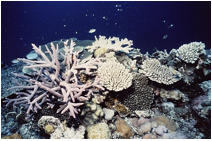
Earth environment, ecosystem and human society are now confronting the global change regarded as the sixth mass extinction event during the new geologic era of Anthropocene. Earth scientists are responsible to tackle this issue by describing, projecting and alerting the early signs of the non-linear changes, based on which the tipping point and possible mitigation and adaptation measures should be addressed.
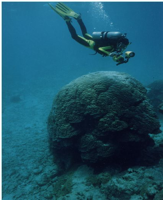
Coral reefs are a model ecosystem directly related to and have already affected and responded to each factor of global environmental changes: suppression of calcification by Ocean Acidification (OA) via CO2 increase, mass bleaching by global warming, and submergence of atoll islands by sea level rise. The world-wide bleaching event in 1998 was regarded as the first event of ecosystem-scale deterioration by global warming. Records of bleaching events and SST for the last 20 years in the northwest Pacific show that resilience has been reduced and coral fauna was replaced in the course of repeated bleaching events, and determined the threshold sea surface temperature as +2°C for the severe bleaching. Reduction of ocean surface water pH to 7.8 would cause shift from hard coral to soft coral that does not have hard skeleton in coral reefs.A standardized protocol to evaluate OA by change in alkalinity was proposed, and autonomous analyzer to measure pH and alkalinity was developed for this protocol.
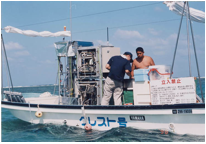
Submergence of coral reefs by sea level rise of up to one meter results in a loss of their breakwater function and atoll islands submergence of national land, while deterioration of ecosystem reduced the resilience against sea level rise. +2°C (or RCP2.6) is the threshold to maintain coral reefs. Factors of global warming and responses of coral reefs are coupled to form feedback loops resulting in a phase shift at the tipping point, which will be applied to other ecosystems including human society.
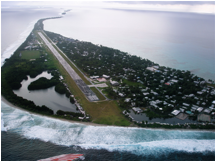
Future Research Plan
Under RCP8.5 scenario, coral reefs in the world is project to vanish by 2070. To tackle this issue, based on the early signatures of coral reef responses to warming, Ocean Acidification and sea level rise, not only monitoring and projection, but also mitigation and adaptationmeasures should be addressed. 1) A series of technologies for mass coral culture by sexual reproduction and outplanting the juveniles have been established, on which population- and ecosystem-scale coral reef restoration technology will be developed. Interventions for natural or artificial selection of corals resistant to heat stress and OA will be conducted and tested in fields to restore coral reefs. 2) To evaluate OA, a compact pH-alkalinity measurement system is now being developed [Patent (5)], which can be deployed to buoys and floats to determine carbonate chemistry in the ocean, so far only pH has been measured. To mitigate OA at least locally, a conjugated effect of coral culture and seaweed farming will be examined in Okinawa, with evaluation of economic values as organic production is removed as harvest. 3) To protect low atoll islands against sea level rise, natural processes of sand and gravel production, transportation and sedimentation will be rehabilitated accompanying with improvement of coastal environment. Also, the enhancement of coral gravel accumulation by permeable seawall, and their lithification will be field-tested. All these interventions based on science should be applied under a socio-economic perspective. Mitigation and adaptation measures with their application to sustain coral reefs will provide a model case to save other ecosystems during the Anthropocene to avoid the sixth mass extinction by transdisciplinary research by uniting not only earth and environmental science, and life sciences, but also social, political and economic sciences.
